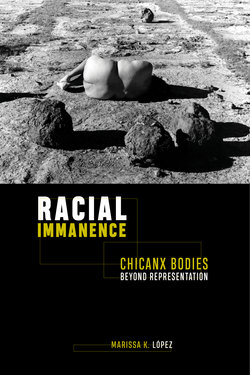Racial Immanence

Реклама. ООО «ЛитРес», ИНН: 7719571260.
Оглавление
Marissa K. López. Racial Immanence
Отрывок из книги
RACIAL IMMANENCE
Chicanx Bodies beyond Representation
.....
Just as scholars have been unable to identify the face at the center of the Sun Stone, bodies in Gilb’s fiction refuse to become objects of truth; refusing knowledge of any sort, they represent neither things nor ideas. Affect theory presents itself as a welcoming home for fiction such as Gilb’s that dwells on, but explicitly rejects interpreting, the body, and yet affect theory also tends to suborn race to a universal physicality. Scholars have long understood race as an ideological construct, exactly the sort of thing that affect theory might help us move “beyond.” As Gregory Seigworth and Melissa Gregg explain in their introduction to The Affect Theory Reader, affect is “the name we give to those forces beneath, alongside, or generally other than conscious knowing” (1). If race is ideological, a function of “conscious knowing,” then where do we find it in a story like “Death Mask”?
Race in “Death Mask” is wholly immanent. It manifests at the end of the story, after the narrator has definitively refused to see the mask, and he describes himself, after forcing Ortíz to justify his travel plans for the mask, as having “stolen his smile” (25). The stealing of the smile is a moment of racial immanence where history can be narrated only through bodily interaction. The men’s bodies become a site of conflict that remains unwritten; the body’s opacity masks interpersonal tensions that cannot emerge in narrative form because the narrator can only physically experience rather than comprehend them.
.....